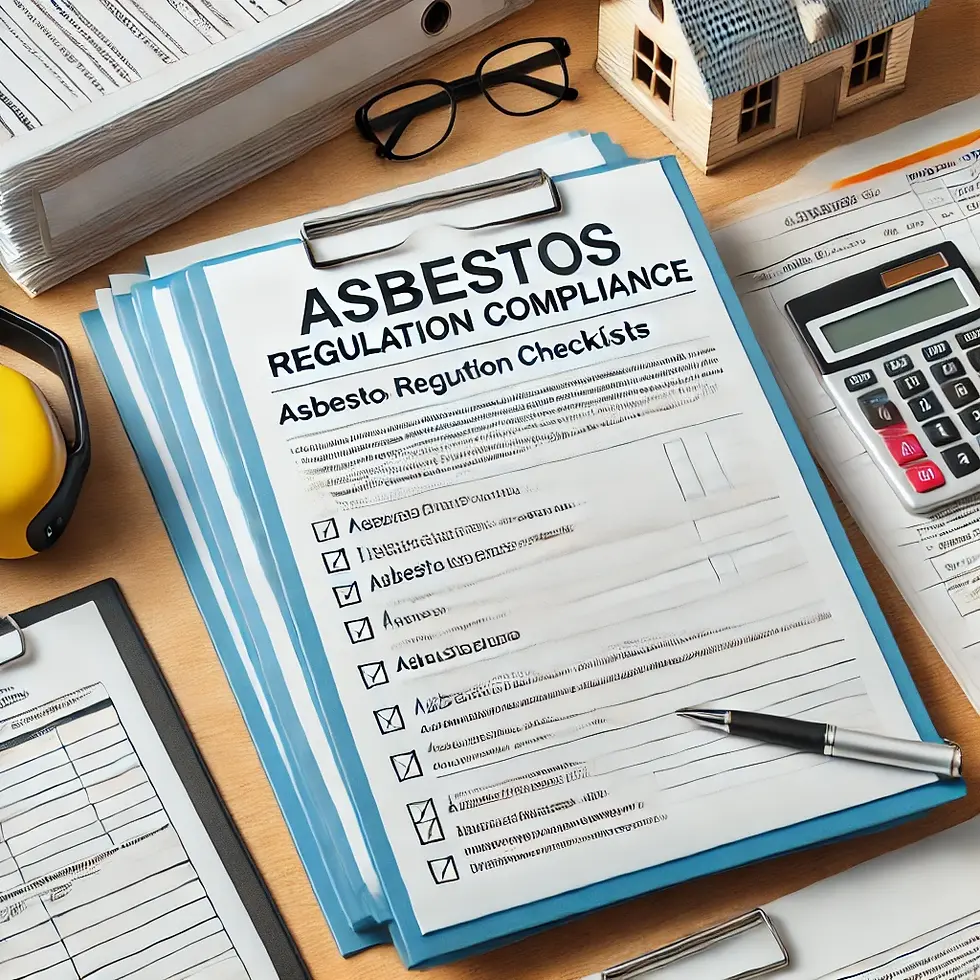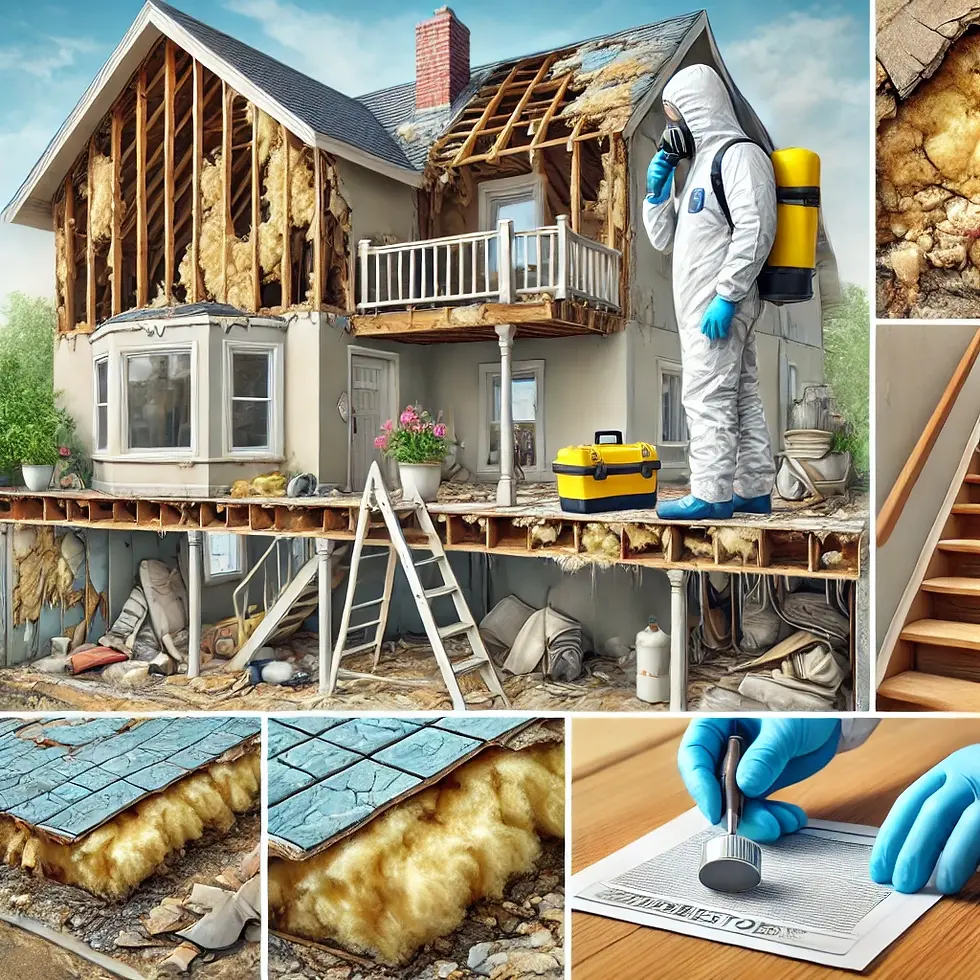Why Asbestos Testing is Crucial Before Any Home Renovation in Denver
- Christina Davis
- Oct 28, 2024
- 5 min read
Planning a home renovation is always exciting, but it’s also a time for careful preparation. If you live in an older Denver home—especially one built before the 1980s—you might encounter hidden dangers like asbestos. Asbestos-containing materials (ACMs) were widely used in construction for their durability and fire resistance, but we now know they pose significant health risks if disturbed. Renovation activities, such as tearing down walls or replacing floors, can easily release asbestos fibers into the air, making asbestos testing a crucial first step for a safe home upgrade.
This guide will walk you through why asbestos testing is essential before renovation, what to expect during the testing process, and how to address asbestos if it’s present in your home.

Understanding Asbestos: A Hidden Hazard in Older Denver Homes
Asbestos is a mineral fiber once commonly used in construction due to its insulating and fireproof qualities. Unfortunately, when asbestos fibers are disturbed, they become airborne and can be inhaled. These fibers are microscopic and can lodge deep in lung tissue, potentially leading to serious health conditions, such as asbestosis, lung cancer, and mesothelioma.
Many older homes in Denver contain asbestos in materials such as:
Insulation: Often found in walls, attics, and around pipes.
Ceiling and floor tiles: Common in kitchens, bathrooms, and basements.
Roof shingles: Used in older roofing materials.
Popcorn ceilings: A well-known source of asbestos in homes built before the 1980s.
Drywall and joint compounds: Asbestos was commonly added to joint compounds for finishing drywall.
If you’re considering any type of renovation, from a simple room remodel to a complete structural overhaul, identifying asbestos-containing materials (ACMs) is essential for a safe process.
Why Asbestos Testing Is Necessary Before Renovation
While asbestos may not pose a risk if left undisturbed, any renovation activity that disrupts asbestos-containing materials can release dangerous fibers. Testing for asbestos ensures you’re taking the necessary steps to keep your family, your home, and any workers safe.
Here’s why asbestos testing is essential before any renovation:
1. Health Risks of Asbestos Exposure
When asbestos-containing materials are disturbed, they release fibers into the air. These fibers can be inhaled and cause serious health problems, which often don’t become apparent until years after exposure. Diseases linked to asbestos exposure include:
Asbestosis: Scarring of lung tissue that causes difficulty breathing.
Lung Cancer: People exposed to asbestos are at a higher risk, especially if they smoke.
Mesothelioma: A rare but aggressive form of cancer that affects the lining of the lungs or abdomen.
Asbestos-related diseases have long latency periods, meaning symptoms may not appear until decades later. This makes it especially important to avoid exposure altogether.
Related Blog: Is Asbestos Dangerous? What You Need to Know
2. Legal and Regulatory Requirements in Denver

The Colorado Department of Public Health and Environment (CDPHE) Regulation 8 requires asbestos testing and inspection for any renovation or demolition project involving buildings constructed before 1989. This regulation mandates that all structures, regardless of use, must be inspected for asbestos if they’re slated for remodeling or demolition, with a few exceptions.
By ensuring you meet this requirement, you’ll avoid potential fines and liabilities. It’s also important to work with a licensed asbestos testing and abatement professional, as they are trained to comply with CDPHE standards and ensure your home renovation meets legal requirements.
What to Expect During Asbestos Testing
Asbestos testing is a detailed process that requires the expertise of certified inspectors. Here’s an overview of what you can expect:
Step 1: Visual Inspection
A certified asbestos inspector will assess your home to identify any suspect materials. They will look at common areas where asbestos is typically found, including flooring, ceiling tiles, walls, insulation, and HVAC systems.
Step 2: Sampling Suspect Materials
If the inspector identifies potential ACMs, they will carefully collect small samples for testing. This is done with utmost caution to prevent releasing fibers into the air. Each sample is then sent to a laboratory accredited by the National Voluntary Laboratory Accreditation Program (NVLAP) for analysis.

Step 3: Lab Analysis
In the lab, experts use polarized light microscopy (PLM) or transmission electron microscopy (TEM) to determine if asbestos is present in the materials. Results are typically available within a few days, allowing you to proceed with a safe plan for your renovation.
Step 4: Results and Next Steps
The asbestos inspection report will outline whether asbestos was found and in which materials. If asbestos is present, the inspector will recommend a course of action, usually either encapsulation or removal by a licensed abatement professional.
Related Blog: Are Do-It-Yourself Asbestos Test Kits Accurate?
Options for Handling Asbestos in Your Home
If asbestos is found, you’ll need to address it before proceeding with any renovation work. Here are your options:
1. Asbestos Abatement
If ACMs are in poor condition or will be disturbed by renovation, abatement (removal) is typically recommended. This process involves a licensed asbestos abatement team who will:
Seal off the area to prevent fibers from spreading.
Remove contaminated materials safely and dispose of them following regulatory guidelines.
Conduct air clearance testing to confirm that the area is safe for renovation.
Related Blog: Step-by-Step Guide to Denver Asbestos Abatement and Clearance Procedures
2. Asbestos Encapsulation
In cases where the asbestos-containing materials are in good condition and won’t be disturbed, encapsulation may be an option. This process involves sealing the materials with a specialized coating to prevent fibers from becoming airborne. Encapsulation is generally less disruptive than removal but should only be done by a licensed professional.
Encapsulation is often a temporary solution and may need to be revisited if future renovations are planned.
The Cost of Asbestos Testing and Abatement in Denver

Understanding the costs involved in asbestos testing and removal is important for planning your renovation budget. Asbestos testing typically costs between $300 and $700, depending on the size of the property and the number of samples taken. If abatement is needed, the cost will vary based on the scope of the project and the extent of asbestos contamination. In general:
Minor abatement projects (e.g., removing a few square feet of tiles) may cost $1,000–$3,000.
More extensive abatement for larger renovations can range from $5,000–$10,000 or more.
While these costs may seem high, asbestos abatement is an investment in your home’s safety and compliance with legal requirements. Additionally, if you’re planning to sell your home, having completed asbestos abatement can add value and appeal to potential buyers.
Why Hire a Licensed Asbestos Professional?
Asbestos testing and abatement require specialized knowledge and equipment. A certified asbestos inspector or abatement professional has the training to:
Handle materials safely to avoid releasing fibers.
Comply with CDPHE regulations to ensure legal compliance.
Protect your home’s air quality by using proper containment and filtration methods.
Attempting to remove or manage asbestos on your own is unsafe and illegal in many cases. Hiring a professional gives you peace of mind and protects your health, your family’s health, and your home’s value.
Conclusion: Protecting Your Home and Health with Asbestos Testing
Asbestos testing may feel like an extra step before your home renovation, but it’s a crucial one. By identifying and managing asbestos-containing materials early, you’re investing in a safer, healthier home. Testing ensures that you’re meeting legal requirements, protecting everyone involved in the renovation, and preserving your home’s value for years to come.
Before you dive into your next renovation project, contact Elevation Environmental for a comprehensive asbestos inspection. Our experienced team provides peace of mind with safe, thorough asbestos testing and abatement solutions for Denver homeowners.


Comments